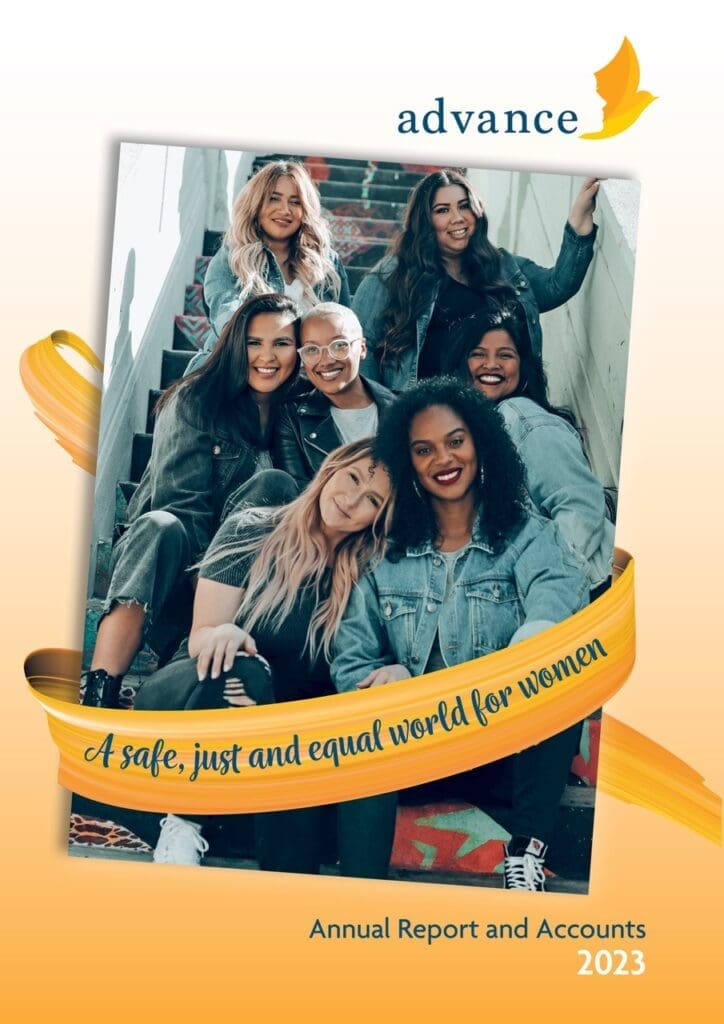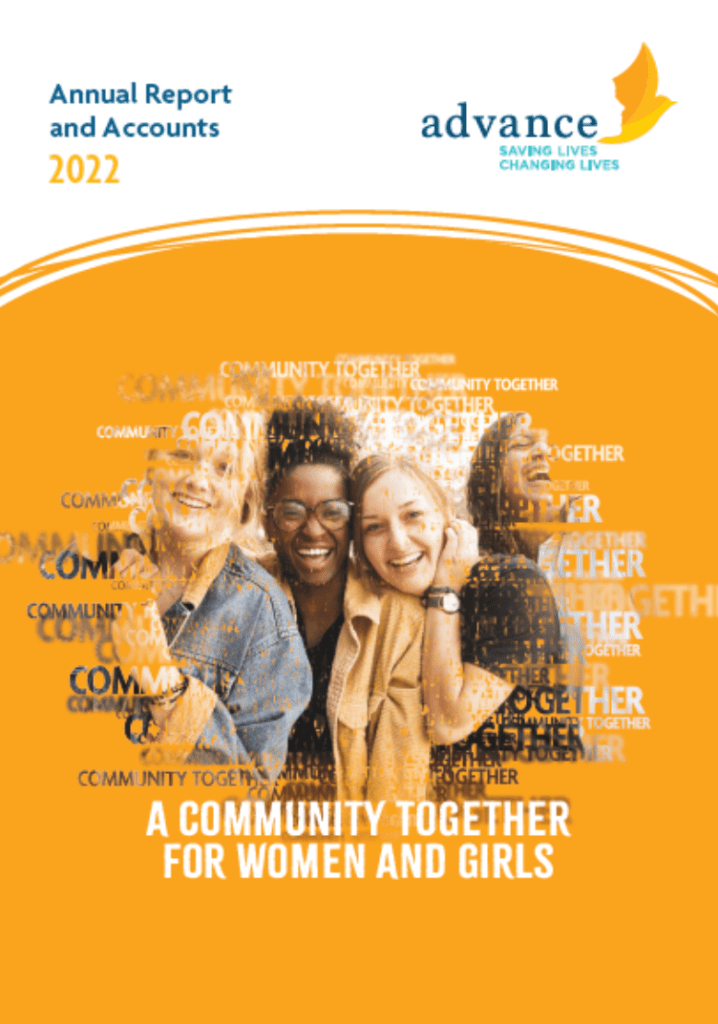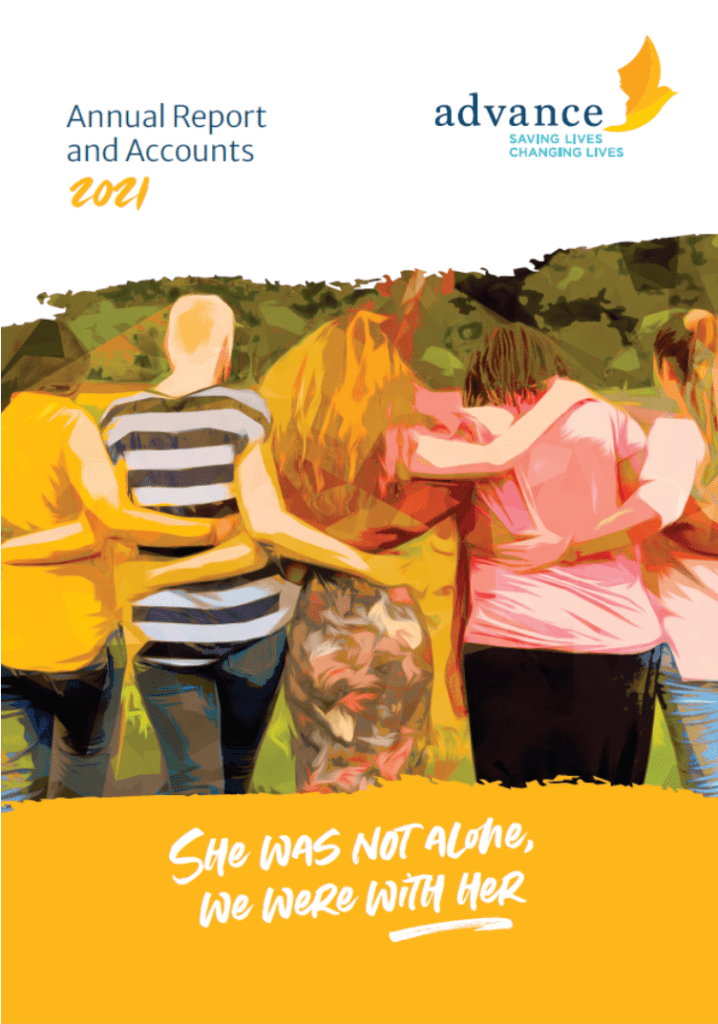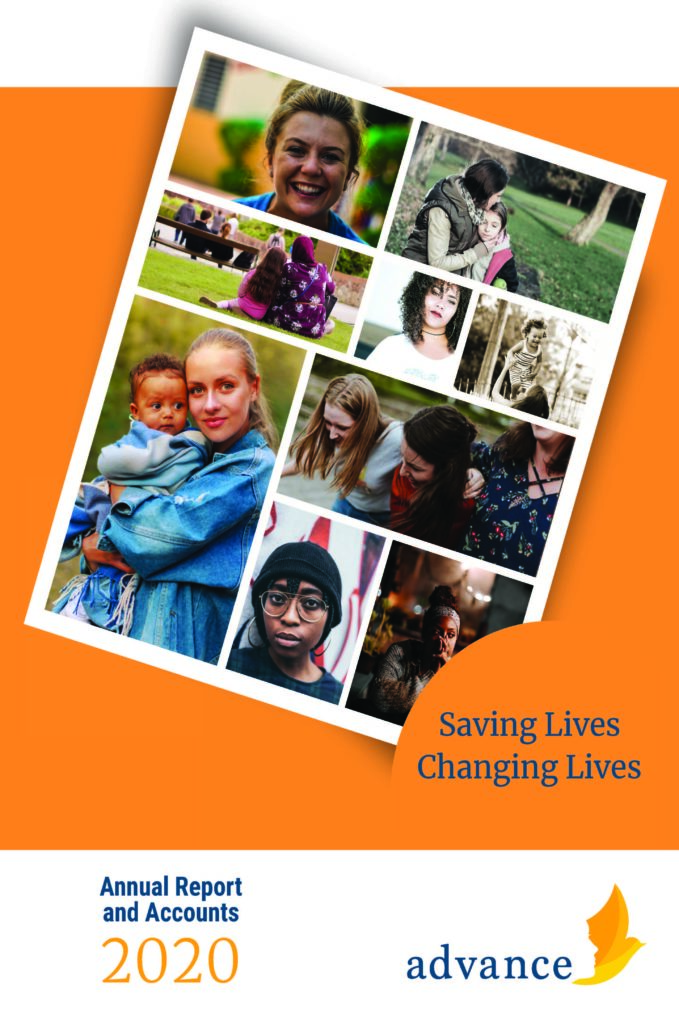Our vision is a world where women and girls lead safe, just and equal lives.
We achieve this through our mission of delivering systems change and empowering women and children who experience domestic abuse, including those in contact with the criminal justice system, to lead safe, just and equal lives in their communities.
Our expertise lies in decades of providing specialist support by women and for women and girls, to achieve safety, justice and equality at the intersection of domestic abuse and the criminal justice system.
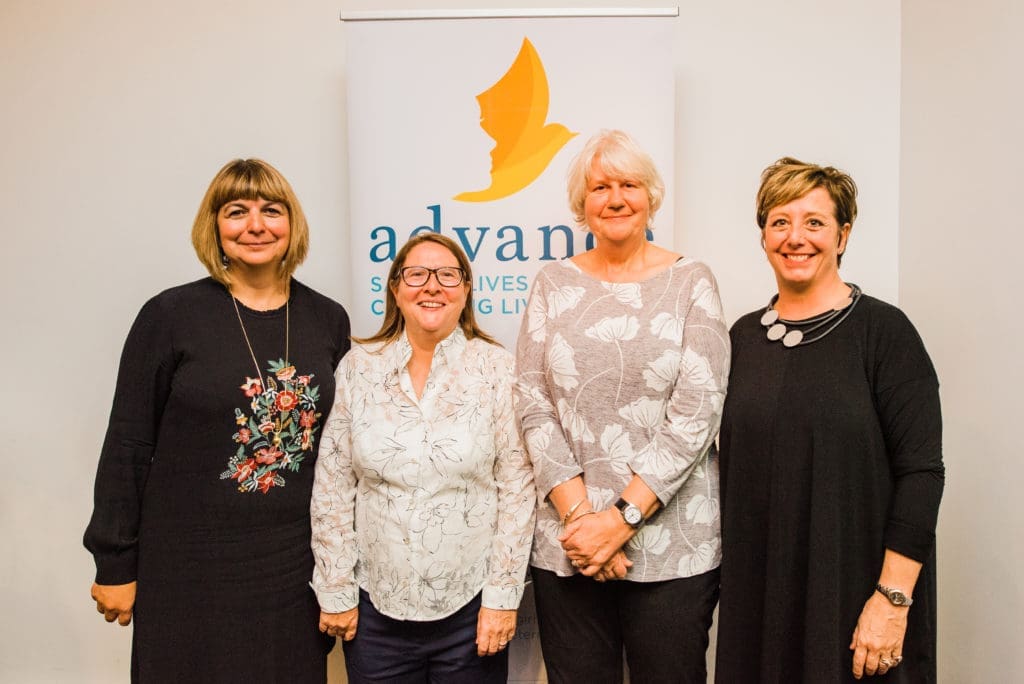
Our founders' message
In 1998, women’s organisations together with criminal justice and statutory agencies in the Borough of Hammersmith & Fulham (LBHF) came together to respond to the fact that out of the 2,000 domestic abuse incidents reported in the area in 1996, there were only 10 convictions.
As a direct result, our founders Bear Montique and Beryl Foster OBE set up Advance Advocacy and Non Violence Community Education, known as Advance, to provide a new service delivery response to survivors in the community, by improving advocacy and access to support in a coordinated way. At the same time, they set up our sister organisation Standing Together Against Domestic Abuse (referred to as Standing Together) aiming to deliver innovation in the strategic and operational response of agencies working with survivors, their children and perpetrators, resulting in the Coordinated Community Response (CCR).
Our work with survivors of abuse and violence
The innovation of the Independent Domestic Violence Advocate (IDVA) model in 2005 was one of the outcomes of Advance’s work, as well as the co-location model within police stations in 2000 and specialist domestic abuse courts, with the first one set up in 2002 in LBHF. Through co-locating with partners, we are able to deliver a joined up response to survivors, both improving their access to support and also sharing knowledge and expertise with professionals and practitioners in those settings, which in turn delivers systems improvements and change to meet the needs of survivors and their children. Since then, Advance has expanded its IDVA co-located model into further statutory settings including hospitals, social care and housing services, courts and probation.
In 2013, Advance and Standing Together, in partnership with criminal justice agencies, developed a new Whole Justice Approach, namely the Impact Programme, which included developing specialist CJ (Criminal Justice) IDVAS and promoting the use of SDAC (Specialist Domestic Abuse Courts) to improve justice outcomes for survivors. Advance’s CJ IDVAs provide one-on-one trauma informed advocacy for survivors through the process from reporting to pre-trial and trial, training for Criminal Justice professionals and a joined up coordinated response for both survivors and professionals to further our mission of changing lives, saving lives.
Our work for women involved in the Criminal Justice System
In 2007, the Corston report (Read HERE) on women in the criminal justice system and in prisons called for a gender-specific response to women in custody, in recognition of the clear link between women’s traumatic experiences and their offending. This led to the launch of the Minerva Service Pilot in 2011– a women only centre offering holistic, consistent and trauma informed support, meeting their individual needs over a long period of time, empowering them to break the cycle of re-offending and preventing the breakdown of families. The Minerva service is now well established and is being delivered across 22 London Boroughs.
In 2019, in partnership with MOPAC and the Metropolitan Police, The Women’s Diversion Service, led by Advance was launched with the aim to integrate a holistic package of support with an out of court disposal, to improve outcomes for the women and offer police officers and the CPS a robust alternative pathway into community services and diverting women away from prosecution through the courts.
Bear Montique and Beryl Foster OBE, working within London domestic abuse services and refuges since the 1970s.
50+ Years of Ending Violence Against Women and Girls movement
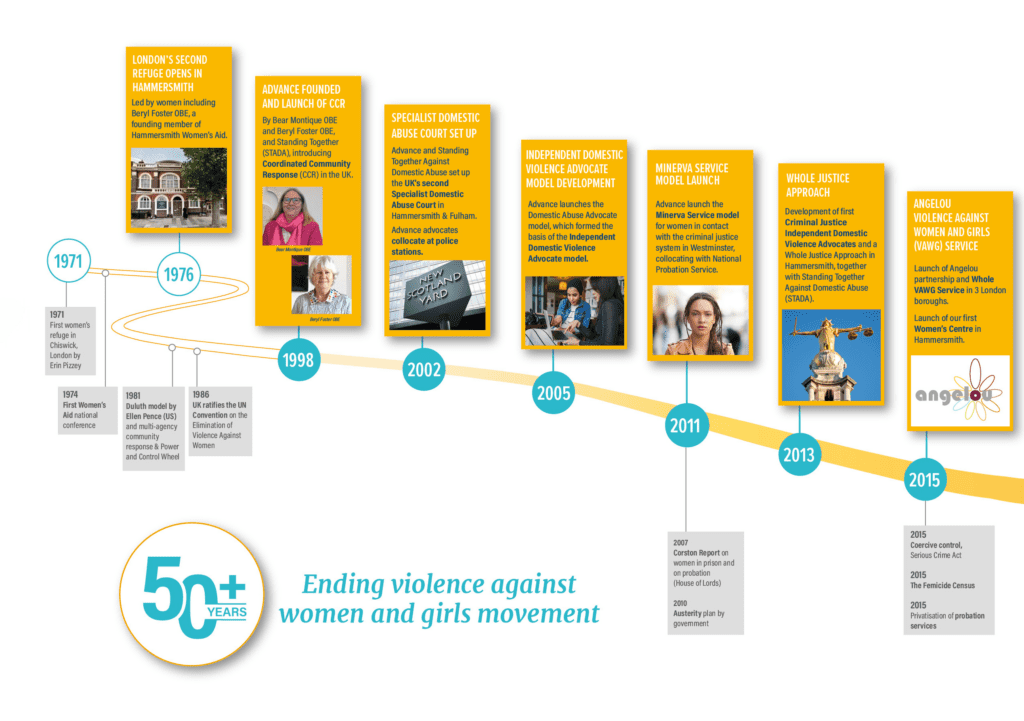
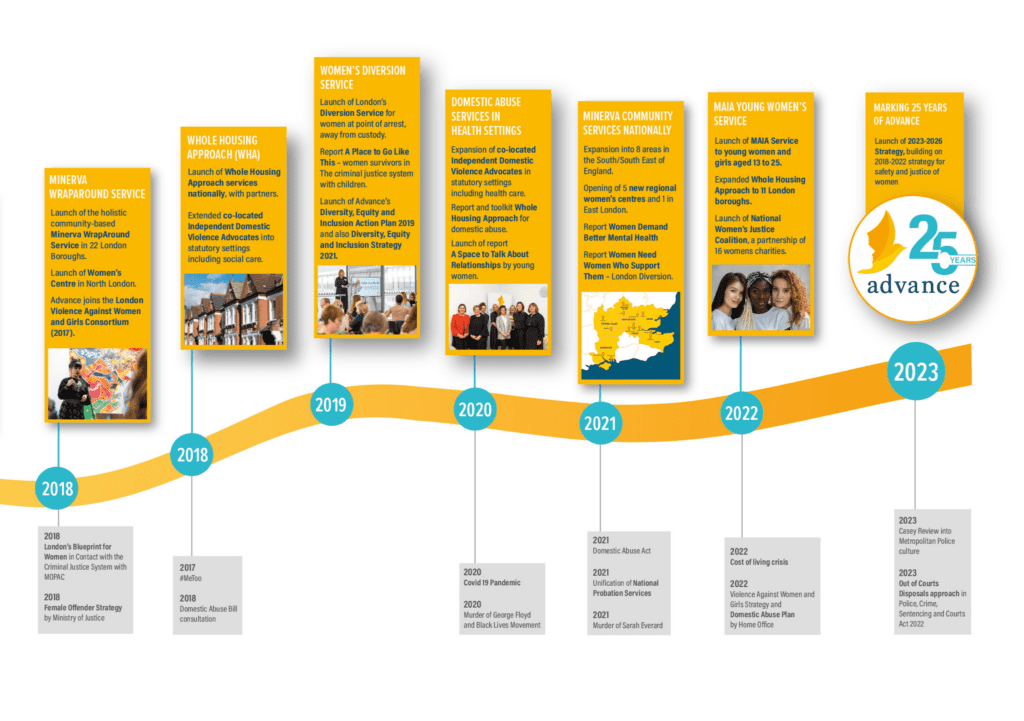
Our values

Listen and support
We listen without judgement, supporting women and girls to openly express themselves and to better understand their experiences and options available.
Empower
We empower women and girls to make their own informed decisions so that they can lead the lives they choose and we respect their choices.
Innovate
We innovate, while managing risks, through our passion for continuous learning and developing solutions for new challenges.
Collaborate
Within and outside the organisation to maximize our shared knowledge and bring greater impact to the women and girls we support.
Accountability
We are accountable and deliver high quality services, through our expertise, our collaborative and proactive approach, which enable better outcomes for women and girls.
Our timeline
Advance is founded by Bear Montique
Advance co-location at the Police stations
First Specialist Domestic Abuse Court (SDAC) in Hammersmith & Fulham
Development of the Advance Domestic Abuse Advocate (led to IDVA Model)
Launch of the Minerva Service Model
Development of the Impact service, and a Whole Justice Approach
Launch of the Minerva WrapAround Approach
Launch of the London Diversion service
Expansion of Minerva services nationally
Launch of Maia & Lift programme
Advance's 25th year anniversary.
Our Strategy 2023-2026
1
Women and children in our communities have access to long-term, wraparound support across all their needs including emotional support.
2
Young women and girls understand domestic abuse and related VAWG (violence against women and girls) issues and are empowered to make informed choices and access support at the earlier point.
3
Raise awareness of and campaign to address the prevalence and scale of the impact of domestic abuse and the criminal justice system on women to improve outcomes and achieve systemic change.
4
Those working for and with Advance are supported to be leaders, change makers and advocates for women and girls.
Confidentiality
Our confidentiality policy states that we will not discuss your case with any other agency without your permission. However, if there are concerns relating to Child Protection issues or if you are at serious risk of harm, we would need to disclose this information to the relevant agencies to help safeguard yourself and your children.
We will only share information that is necessary and will do so in a respectful and safe way.


